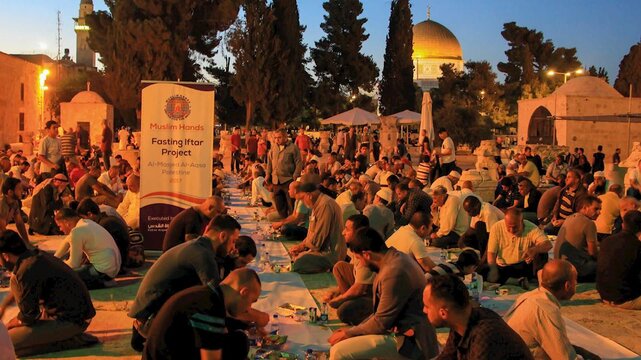The blessed month of Ramadan is here, alhamdulillah! With that in mind, we’ve put together an article presenting the basic rules of fasting. This includes: the definition of fasting, who needs to fast in Ramadan, who is exempt from fasting, what breaks our fast and what doesn’t break our fast! Please note: this article is based on the Hanafi madhab.
What is the definition of fasting in Islam?
Fasting is ‘to abstain from food, drink and marital relations from daybreak to sunset, with the intention of drawing near to Allah (swt)’, according to Shaykh Haroon Hanif.
The above definition refers to an ‘intention of drawing near to Allah’, which makes a religious fast distinct from merely dieting or practicing intermittent fasting. But what, precisely, does it mean to intend something?
An intention is: the determination you feel in your heart to do something. Your intention doesn’t have to be verbally stated, although this is certainly preferable.
Practically speaking, it would be almost impossible to not have the intention to fast in the Hanafi school. A good way of understanding what makes ‘an intention’ is this: if a person asks you ‘What are you doing?’ and your reply is ‘Fasting’ - then you have clearly intended to fast and are now carrying out that intention!
The intention to fast must be made separately for each day of Ramadan. You can make the intention at any time from the Maghrib prayer of the previous night up to before the ‘Islamic midday’. The Islamic midday is the midpoint between the start of the Fajr prayer and the start of the Maghrib prayer. For example, if Fajr starts at 5 AM and Maghrib starts at 5 PM, then the Islamic midday would be 11 AM.

Who has to fast in Ramadan?
All adult Muslims of sound mind are required to fast in Ramadan. From the Islamic perspective, an adult is defined as follows:
Islam is the way of the Fitrah (the natural, primordial way) and thus someone becomes an adult once they enter puberty.
A male child becomes an adult when he experiences a wet dream or ejaculation.
A female child becomes an adult when she experiences a wet dream or her first menstruation.
If none of these have occurred for either the male or female by the age of 15 lunar years, they would automatically be considered adults and be obliged to fast.
Who is exempt from fasting in Ramadan?
The following Muslims are exempt from fasting in Ramadan.
A sick person:
Someone who is ill to the extent that it will seriously affect their health if they fasted. This is determined by clear manifest signs, the judgement of a practising Muslim doctor or by previous experience.
A traveller:
A traveller is defined as someone who intends to travel to a place which is longer than 48 miles away. He must also intend to stay there for less than 15 days, otherwise he would be considered a resident. It must be noted that a traveller is only excused from fasting in Ramadan if he begins his journey before the time of Fajr enters. If a person begins fasting a day in Ramadan and then travels, he is obliged to complete his fast.
What is the definition of fasting in Islam?
Fasting is ‘to abstain from food, drink and marital relations from daybreak to sunset, with the intention of drawing near to Allah (swt)’, according to Shaykh Haroon Hanif.
The above definition refers to an ‘intention of drawing near to Allah’, which makes a religious fast distinct from merely dieting or practicing intermittent fasting. But what, precisely, does it mean to intend something?
An intention is: the determination you feel in your heart to do something. Your intention doesn’t have to be verbally stated, although this is certainly preferable.
Practically speaking, it would be almost impossible to not have the intention to fast in the Hanafi school. A good way of understanding what makes ‘an intention’ is this: if a person asks you ‘What are you doing?’ and your reply is ‘Fasting’ - then you have clearly intended to fast and are now carrying out that intention!
The intention to fast must be made separately for each day of Ramadan. You can make the intention at any time from the Maghrib prayer of the previous night up to before the ‘Islamic midday’. The Islamic midday is the midpoint between the start of the Fajr prayer and the start of the Maghrib prayer. For example, if Fajr starts at 5 AM and Maghrib starts at 5 PM, then the Islamic midday would be 11 AM.

Who has to fast in Ramadan?
All adult Muslims of sound mind are required to fast in Ramadan. From the Islamic perspective, an adult is defined as follows:
Islam is the way of the Fitrah (the natural, primordial way) and thus someone becomes an adult once they enter puberty.
A male child becomes an adult when he experiences a wet dream or ejaculation.
A female child becomes an adult when she experiences a wet dream or her first menstruation.
If none of these have occurred for either the male or female by the age of 15 lunar years, they would automatically be considered adults and be obliged to fast.
Who is exempt from fasting in Ramadan?
The following Muslims are exempt from fasting in Ramadan.
A sick person:
Someone who is ill to the extent that it will seriously affect their health if they fasted. This is determined by clear manifest signs, the judgement of a practising Muslim doctor or by previous experience.
A traveller:
A traveller is defined as someone who intends to travel to a place which is longer than 48 miles away. He must also intend to stay there for less than 15 days, otherwise he would be considered a resident. It must be noted that a traveller is only excused from fasting in Ramadan if he begins his journey before the time of Fajr enters. If a person begins fasting a day in Ramadan and then travels, he is obliged to complete his fast.





